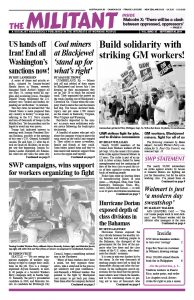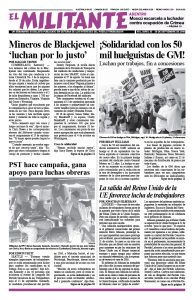A series of drone and missile attacks, claimed by Iranian-backed Houthi forces in Yemen, severely damaged Saudi Arabia’s biggest oil site Sept. 14, cutting world oil supplies and escalating prices. President Donald Trump threatened the U.S. military was “locked and loaded, depending on verification,” to retaliate.
Two days later, he warned that “the United States is more prepared than any country in history” to wage war, referring to the U.S. Navy armada and tens of thousands of troops in the Middle East. Yet the president said he hoped to avoid any war moves.
Trump had indicated interest in meeting with Iranian President Hassan Rouhani, possibly at the opening of this year’s U.N. General Assembly session. He said Sept. 17, after the attack on Saudi oil facilities, he no longer saw that happening. Iranian Supreme Leader Ayatollah Ali Khamenei ruled out any talks the same day, claiming, “Iranian officials, at any level, will never talk to American officials.”
The U.S. administration announced yet another round of sanctions Sept. 18, which chiefly hurt Iranian working people. Washington sees the increased military and political sway of the Iranian rulers across Iraq, Lebanon, Syria and Yemen as the biggest obstacle to defending its imperialist interests and the interests of its allies in the region.
“The Socialist Workers Party says U.S. hands off Iran!” Malcolm Jarrett, SWP candidate for Pittsburgh City Council, said in Cumberland, Kentucky, Sept. 17. “Workers have no interest in interfering with the sovereignty of the people of Iran. We demand: End U.S. sanctions and get all U.S. troops out of the Middle East!
“We don’t know whether Washington will use its formidable military assets in the area to hit at Iran, but whenever the U.S. government makes threats of military action, opponents of Washington’s wars have an obligation to speak out and protest,” Jarrett said.
Houthi Islamist forces said they had launched 10 drones from Yemen. The Iranian government-backed Houthis seized control of Yemen’s capital, San’a, in 2014. Since then, a U.S.-backed, Saudi-led coalition has been mounting relentless air strikes in Yemen, killing thousands of civilians. The conflict has reduced 10 million people, one-third of the population, to utter dependence on international food aid.
Key Saudi oil facilities damaged
The quite sophisticated operation included at least 17 hits on the massive Abqaiq oil processing plant near the Arab-Persian Gulf, run by the Saudi state oil company Aramco and nearby Khurais oil field. U.S. officials contend that satellite photos indicate the attacks came from the north — from Iran or from pro-Iranian militias in Iraq — not from Yemen in the south.
Iranian Foreign Minister Javad Zarif denied his government was involved. He said Washington had failed at its maximum-pressure sanctions campaign and was now practicing “maximum deceit.”
The Tehran-based Fars news agency, which reflects views of the Iranian Revolutionary Guard, did say the attack on the oil refinery was “smart and timely.”
The damage to Saudi oil production at Abqaiq will mean the loss for weeks of up to 5% of global supply. Capitalist pundits expressed concern about the impact of higher fuel prices on a slowing world economy.
The attack came days after Trump fired National Security Adviser John Bolton Sept. 10, citing disagreements with his more bellicose line towards Iran, the Taliban in Afghanistan, and other regimes and forces Washington opposes.
The challenges facing the Trump administration are due to a disintegrating decades-old imperialist world order as the dominance of the U.S. rulers — unchallenged since they emerged the primary victor out of the second imperialist world slaughter — is receding.
In his State of the Union address Feb. 5, the president had said, “Great nations do not fight endless wars.” Trump has since said he would seek to reduce the U.S. military presence in Afghanistan and the Middle East.
Trump had planned to hold discussions with Taliban and Afghan government officials Sept. 8 in an effort to reduce U.S. engagement in Afghanistan, but cancelled the talks after the Islamist group carried out a bomb attack that killed a U.S. soldier and 11 others.
The bourgeois clerical regime seeks to increase its regional power and influence by force of arms. It emerged from a counterrevolution that pushed back against gains made by workers, farmers, women and oppressed nationalities who carried out the 1979 Iranian Revolution that overthrew the U.S.-backed shah.
This revolution was a deep, modern popular social revolution, not a religious jihad. Iran’s clerical bourgeois officials today are held up by the U.S. media of all political stripes as “leaders of the revolution.” But they are in fact leaders of the counterrevolution. There will be no end to Tehran’s reactionary wars, expansionism and anti-working-class social policies without an end to the counterrevolutionary regime.
“The sanctions and threats of Washington are an obstacle to Iranian workers and farmers gaining the political space to organize,” said Jarrett. “That’s why working people here need to campaign for U.S. rulers hands off Iran.”

